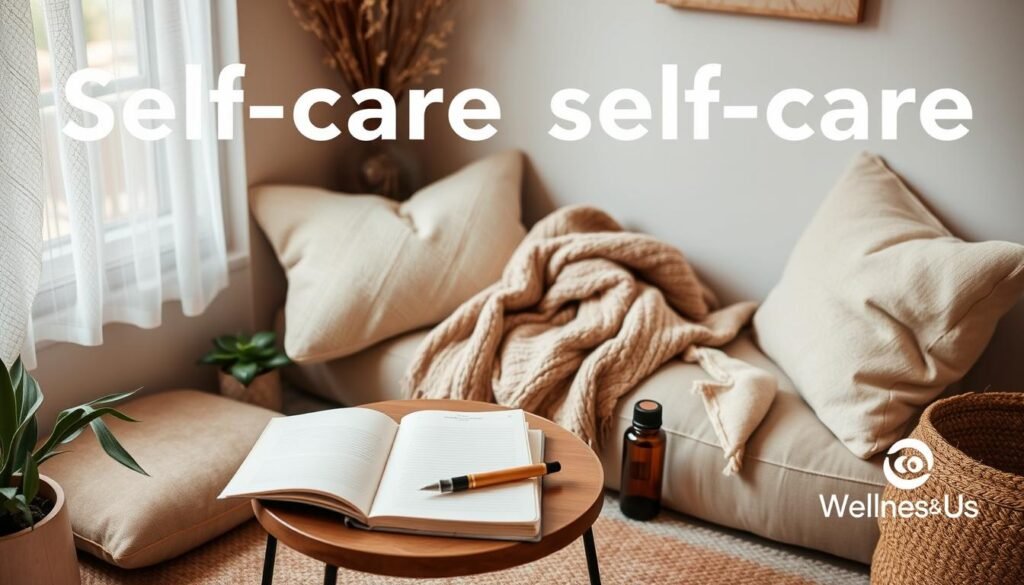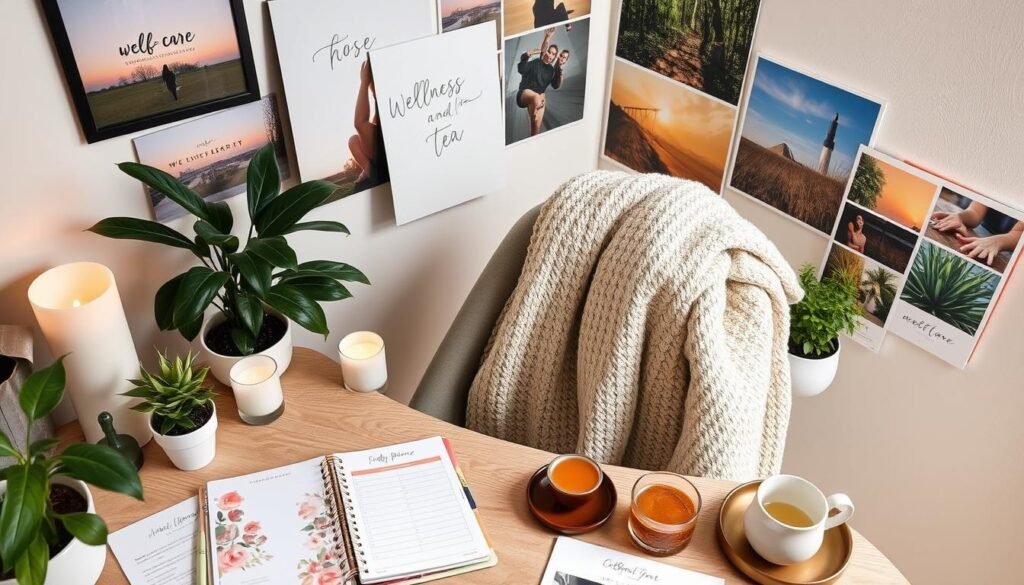Did you know 80% of Americans feel a lot of stress? Yet, only 35% make self-care a regular part of their lives. This shows a big gap in how we take care of ourselves every day.
Self-care is not just nice to have; it’s essential for staying balanced. It’s about making self-care habits that fit your life and needs, not just following what others do.
Everyone’s self-care looks different. What works for one person might not work for another. The goal is to find a self-care plan that grows with you and supports your well-being.
Key Takeaways
- Self-care is a personalized journey of wellness
- Individual needs drive effective self-care strategies
- Consistent practices matter more than perfection
- Self-care adapts with your changing life circumstances
- Prioritizing yourself is not selfish—it’s essential
Understanding the Importance of Self-Care
Self-care is key to keeping your well-being and mental health strong. It’s more than just relaxing. It’s a way to care for your body, mind, and spirit.
https://www.youtube.com/watch?v=64ZGXEtgE3Q
Many think self-care is a luxury. But it’s really essential for staying well. It means doing things that help you feel emotionally balanced and strong.
The Benefits of Regular Self-Care
Self-care has many benefits for a better life:
- Reduces stress and anxiety levels
- Enhances emotional regulation
- Improves overall mental health
- Boosts self-awareness and personal growth
“Self-care is not selfish. You cannot serve from an empty vessel.” – Eleanor Brown
How Self-Care Contributes to Mental Health
Mental health self-care builds strong coping skills and emotional smarts. With good self-care, you can handle life’s ups and downs better.
| Self-Care Domain | Mental Health Impact |
|---|---|
| Physical Activities | Reduces depression symptoms |
| Emotional Processing | Increases emotional resilience |
| Social Connections | Prevents isolation and loneliness |
Investing in self-care is an investment in your mental and emotional well-being.
Identifying Your Self-Care Needs
Knowing what you need for self-care is key to a good wellness plan. Self-care is a personal journey, not a one-size-fits-all solution.

Starting your self-care journey means looking at your physical, emotional, and mental health. By checking these areas, you can make self-care plans that fit you perfectly.
Assessing Your Physical Health
Your physical health is the base of your wellness. Think about these important points:
- Sleep quality and how long you sleep
- What you eat and how often you eat
- How active you are and what kind of exercise you do
- Managing your energy levels
Evaluating Your Emotional Well-Being
Emotional health is a big part of self-care. Look at these areas:
- How you handle stress
- How resilient you are emotionally
- Your relationships
- How well you handle and share your feelings
Recognizing Your Mental Health Requirements
Mental health needs special care. Look at these important parts:
| Mental Health Dimension | Assessment Criteria |
|---|---|
| Cognitive Function | Focus, memory, learning abilities |
| Psychological Resilience | Coping skills, adaptability |
| Stress Response | Managing anxiety, controlling emotions |
“Self-care is not selfish. You cannot serve from an empty vessel.” – Eleanor Brown
By knowing your unique needs in physical, emotional, and mental areas, you can make a self-care plan that really helps your overall health.
Types of Self-Care Practices
Self-care is about keeping yourself well-rounded. It’s important to know the different parts of self-care. This helps you make a routine that covers all your health needs.

Trying out different self-care activities helps you find what works best for you. It lets you create a self-care plan that’s both balanced and personal.
Physical Self-Care Strategies
Physical self-care is about keeping your body healthy and full of energy. Here are some ideas:
- Regular exercise routines
- Balanced nutrition
- Adequate sleep
- Regular medical check-ups
- Staying hydrated
Emotional Self-Care Activities
Emotional self-care is about understanding and managing your feelings. Here are some tips:
- Journaling
- Practicing mindfulness meditation
- Seeking therapy or counseling
- Engaging in creative expression
- Setting healthy emotional boundaries
Social Self-Care Connections
Social self-care is about building and keeping good relationships. Here are some activities to try:
- Scheduling regular time with friends
- Joining community groups
- Participating in team activities
- Maintaining positive communication
- Practicing active listening
Spiritual Self-Care Approaches
Spiritual self-care helps you find meaning and peace. Here are some practices to explore:
- Meditation
- Yoga
- Spending time in nature
- Practicing gratitude
- Exploring personal beliefs
“Self-care is not selfish. You cannot serve from an empty vessel.” – Eleanor Brown
By mixing these self-care practices, you get a complete approach to wellness. It ensures you take care of your physical, emotional, social, and spiritual health.
Creating a Self-Care Plan
Creating a self-care plan is key for your mental and physical health. Self-care isn’t a one-size-fits-all thing. It’s about finding what works best for you and your life.

Setting Realistic Goals
Starting with achievable goals is the first step in self-care. Here’s how to do it:
- Know what you want to focus on for your wellness
- Break big goals into smaller, doable steps
- Make your self-care plans clear and trackable
“Your self-care plan should inspire, not overwhelm you.” – Wellness Expert
Scheduling Your Self-Care Time
Managing your time well is key to adding self-care to your day. Set aside specific times for self-care.
- Look at your current schedule
- Find moments in your day for self-care
- Make sure to keep these times consistent
Remember, successful self-care is about being consistent and intentional.
Making Self-Care Part of Your Routine
Adding daily self-care to your life makes wellness a regular part of your routine. It helps you build resilience and manage stress. It also keeps your mental and physical health in top shape.

Creating successful self-care habits needs careful planning and dedication. It’s about making personal rituals that fit easily into your daily life.
Morning Self-Care Practices
Start your day with morning self-care that boosts your energy and focus:
- Drink water as soon as you wake up
- Do 10 minutes of meditation or deep breathing
- Write down three things you’re grateful for
- Stretch or do some light yoga
- Have a healthy breakfast
“The way you start your morning sets the tone for your entire day.” – Unknown
Evening Wind-Down Rituals
Evening self-care helps you relax and prepare for sleep:
- Stay off digital devices for an hour before bed
- Do some gentle stretching
- Read a book that calms you
- Take a warm bath
- Listen to soft music or guided meditation
Remember, self-care is not selfish—it’s essential for maintaining your overall well-being and productivity.
Overcoming Barriers to Self-Care
Self-care is key for mental health, but many find it hard to keep up. Knowing and tackling the hurdles to self-care can help you stick to it.
Common Obstacles in Self-Care
Many face barriers when trying to add self-care to their lives. These obstacles can stop even the best self-care plans.
- Lack of time
- Financial constraints
- Feelings of guilt
- Low motivation
- Overwhelming responsibilities
Strategies for Staying Motivated
Building resilience in self-care needs practical solutions to beat obstacles.
| Obstacle | Motivation Strategy |
|---|---|
| Time Constraints | Start with 10-minute daily practices |
| Low Motivation | Set small, achievable goals |
| Guilt | Reframe self-care as necessary, not selfish |
“Self-care is not a luxury, it’s a responsibility to yourself.” – Unknown
Remember, starting self-care is a slow process. Be kind to yourself and celebrate every small win.
Customizing Your Self-Care Routine
Self-care isn’t the same for everyone. It should reflect your unique personality, interests, and lifestyle. A personalized self-care routine means finding activities that truly bring you joy and relaxation.
Personal Preferences and Interests
Creating self-care ideas that fit your style can make everyday activities special. Here are some tips to make your self-care routine your own:
- Find activities that genuinely excite you
- Think about hobbies that recharge your batteries
- Try out different self-care activities
- Trust your gut about what feels caring
“The best self-care routine is the one you’ll actually do consistently.” – Wellness Expert
Tailoring Your Routine to Your Lifestyle
Making self-care a part of your daily life needs careful planning. Your lifestyle, work schedule, and personal commitments should guide your self-care. Some might prefer morning meditation, while others like evening journaling better.
- Look at your current daily schedule
- Find realistic times for self-care
- Choose self-care activities that are flexible
- Be open to changing your routine
Remember, the goal is creating a sustainable and enjoyable self-care practice that feels natural and supportive of your overall well-being.
Incorporating Mindfulness into Self-Care
Mindfulness is a key self-care strategy for better mental health and well-being. It helps you be more aware in your daily life. This can reduce stress and improve your mental health.
Mental health self-care is more than just relaxing. It’s about connecting deeply with yourself and the world around you. Mindfulness keeps you in the moment, helps with emotional challenges, and builds resilience.
Mindfulness Techniques to Try
- Breathing meditation
- Body scan exercises
- Guided visualization
- Mindful walking
- Journaling with awareness
Benefits of Mindfulness in Daily Life
| Mindfulness Practice | Mental Health Benefit |
|---|---|
| Meditation | Reduces anxiety |
| Deep breathing | Lowers stress levels |
| Mindful observation | Improves emotional regulation |
“Mindfulness isn’t about perfection, it’s about being present and kind to yourself.” – Wellness Expert
Adding these self-care practices to your daily routine can greatly enhance your mental clarity and emotional balance. Begin with small steps, be gentle with yourself, and see how mindfulness changes your daily life.
The Role of Physical Activity in Self-Care
Physical activity is key to good self-care. It improves your health and boosts your mood. Exercise can greatly improve your life.
Seeing how physical self-care links to overall health is important. It’s not just about getting fit. It’s about caring for your whole self.
Types of Exercise for Self-Care
- Low-impact activities like walking and swimming
- Yoga and stretching for flexibility
- Strength training for muscle health
- Dance fitness for joyful movement
- Outdoor activities like hiking and cycling
Finding Joy in Movement
Finding the right exercise is key to lasting self-care. Not everyone likes the gym. That’s okay.
“Movement is a medicine for creating change in a person’s physical, emotional, and mental states.” – Carol Welch
| Exercise Type | Benefits | Difficulty Level |
|---|---|---|
| Walking | Cardiovascular health, low stress | Low |
| Yoga | Flexibility, mental clarity | Medium |
| High-Intensity Interval Training | Rapid fitness, metabolism boost | High |
Try different activities to find what works for you. The best exercise is one you enjoy and do often.
Tracking Your Self-Care Progress
Creating effective self-care routines is more than just making a plan. It’s important to track your progress to see how it affects your well-being.
Keeping track of your self-care habits helps you stay on track and motivated. By writing down your experiences, you learn what works best for you.
Journaling Your Experiences
Journaling is a great way to reflect and track your progress. Here are some tips to help you document your self-care:
- Use a notebook or a digital app for tracking
- Record your daily feelings and energy
- Write down the self-care activities you do
- Share any personal insights or breakthroughs
“The most important conversations you’ll ever have are the ones you’ll have with yourself.” – David Goggins
Evaluating Effectiveness and Making Adjustments
Regularly checking in helps improve your self-care plan. Here’s how to evaluate your routine:
- Look over your journal entries each week
- Notice any patterns in your mood and energy
- Find out which self-care habits help the most
- Change your routine based on what you learn
Remember, self-care is always changing. What works today might need to change tomorrow.
By regularly tracking and reflecting on your self-care, you’ll create a routine that truly works for you. This will help keep your mind and body healthy.
The Importance of Reassessing Your Routine
Self-care is a journey that keeps changing. Your wellness plans should grow with you. It’s important to check your self-care often to make sure it fits your life.
Signs It’s Time to Change Your Self-Care Plan
Knowing when to update your self-care is key. Feeling stressed or unmotivated often means it’s time for a change. Listen to your body and mind for signs that your self-care needs a refresh.
How to Refresh Your Self-Care Strategy
Begin by looking at what self-care you’re doing now. Think about what works and what doesn’t. Try new things, change your schedule, or find new wellness practices that fit your life.
Being open to change helps keep your self-care meaningful and lasting. Be kind to yourself as you explore and learn. See this as a chance to grow and discover more about yourself.










































Discussion about this post